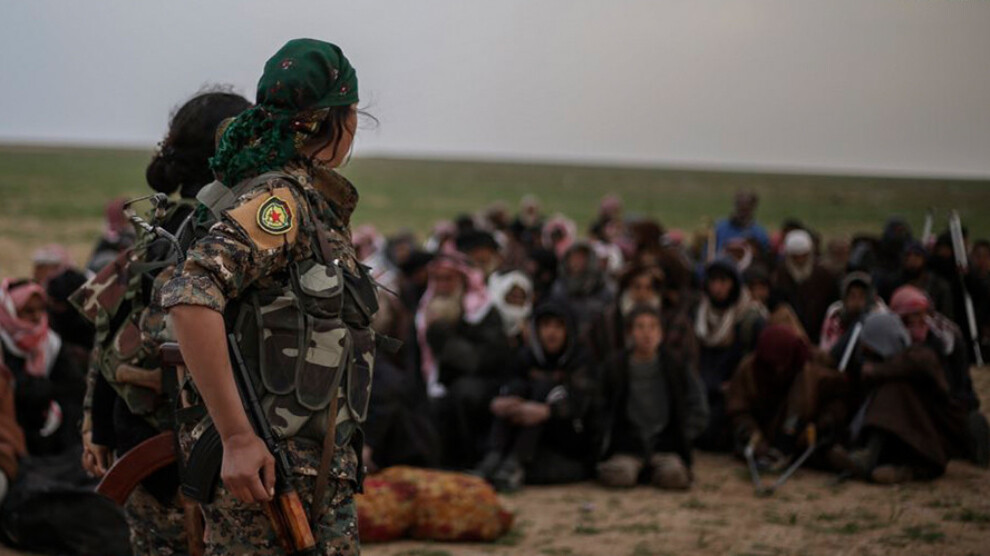Preparations underway for ISIS trials in North-East Syria
In the autonomous region of northern and eastern Syria, preparations are underway for trials of thousands of imprisoned ISIS members from sixty different countries.
In the autonomous region of northern and eastern Syria, preparations are underway for trials of thousands of imprisoned ISIS members from sixty different countries.

The Autonomous Administration of North and East Syria (AANES) announced on 10 June that it would try foreign ISIS members in local courts. This followed years of appeals to the states of origin to set up an international court to punish the crimes committed by the organization. Because there was no response and AANES is left alone with thousands of ISIS prisoners from about sixty different countries, a local judicial process is now to take place.
Preparations for the trials are underway, but many questions remain unanswered. Citing AANES sources, ANHA news agency reported that the trials are expected to begin within a short time. The exact date and locations of the trials are not known, but are likely to be made public in the coming days. According to the information, the trials will be held in public, in people's courts affiliated to the Social Justice Council. Presumably, relatives of ISIS victims will be admitted as joint plaintiffs, but there is no official statement on this question either. It is also unclear whether trial observers from abroad will be allowed. According to ANHA, however, the autonomous administration has an interest in presenting its justice system worldwide.
There is no death penalty in north-east Syria. AANES faces the challenge of combining its own laws with international law in the fight against terrorism. The question of whether the accused will have a lawyer's defence and what should happen to the convicts after they have completed their prison sentence is also being discussed.
Trials will be open to the public
As part of the preparations, the Social Justice Council and the People's Defence Court are holding meetings and discussions. According to sources, methods and details of trials will be discussed at these meetings.
The same sources say that ISIS members will be tried in the People's Defence Court under the umbrella of the Social Justice Council.
It is reported that the trials will be open to the public and media outlets will be allowed to monitor them. Which media outlets will attend the trials and how and in what capacity the families of martyrs or victims will attend the trials have not been announced yet, but according to the information obtained, families of martyrs and victims will be able to participate as plaintiffs. Martyrs' families will be able to follow the trials through the Council of Martyrs' Families or in person.
It is not yet clear whether observers from outside the region will be allowed to monitor the trials. However, Autonomous Administration sources say that they want to show the world their sense of justice with these trials.
The Lawyers' Union will also play an important role during the trials. According to some sources, one lawyer will be appointed for each family for free. Families of martyrs who are not on the ground will be able to intervene in the hearings through their lawyers.
Domestic and international laws will guide the trials
Autonomous Administration officials point out that ISIS members will be tried according to the anti-terror laws of the Autonomous Administration and international laws.
According to legal sources, ISIS members will be tried and sentenced for the crimes they have committed. If there is not any specific accusation (murder, extortion, torture, immorality, etc.) against an ISIS member, this person will only be judged for "membership in a criminal organization". If an ISIS member is accused of crimes other than membership (murder, accomplicity to murder, aid, torture, kidnapping, etc.), this person will be judged by a separate article. Penalties will be case-specific. There is no death penalty in Autonomous Administration laws, so prison sentences range from light to life imprisonment.
Other issues currently discussed and likely to come to the fore during the hearings are "What will happen to ISIS members whose sentences are over, where will they be sent, will their countries accept them or not?" Discussions and evaluations in this regard are continuing.
ISIS members will be informed about laws and rights
An important aspect of the trials will be the protection of ISIS members’ rights. According to legal experts, no lawyer can defend ISIS members, yet the Lawyers' Union will explain the laws and their rights to ISIS members within the legal framework and according to a court decision. It is not yet known whether lawyers from outside the Autonomous Administration regions will be allowed to defend ISIS members, but according to the information available, if a lawyer wants to come, she/he will have to get permission from the Autonomous Administration and act according to the laws of the region.